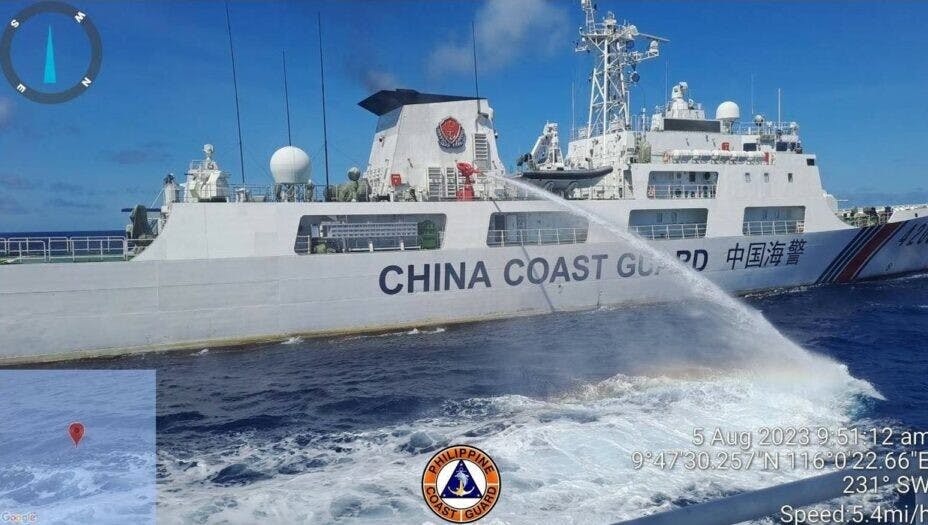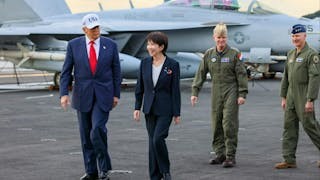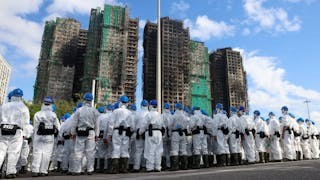中國和菲律賓之間就南海島礁主權的爭端,演變成中國海警船使用高壓水炮,阻止菲律賓補給船向停泊在仁愛礁附近一艘舊軍艦上的部隊運送燃料、食物和水。事件立即引起菲律賓方面的外交抗議並得到美國的支持,中方隨即反駁。整個事件說明了南海島礁主權爭端複雜的地緣政治。
菲律賓政府召見中國駐馬尼拉大使,抗議中國海警的行動。
中國聲稱其對仁愛礁(菲律賓稱阿永金暗沙)擁有主權,菲律賓軍方應將擱淺的軍艦移出該島礁區域,菲律賓方面一直拒絕這樣做。
中菲南海仁愛礁之爭
歷史上,中國宣稱對南海仁愛礁擁有主權。中國對南海的主權延伸到「九段線」,與其他聲聲擁有主權的國家和地區,包括台灣、文萊、馬來西亞、印度尼西亞、越南和菲律賓的一些專屬經濟區重疊。1974年中越海戰期間,中國收回西沙群島。1995年,中國控制了美濟礁,菲律賓聲稱對該島礁擁有主權。2016年,海牙國際法庭審理了菲律賓提出的訴訟,裁定中國的「九段線」和歷史主張被《聯合國海洋公約》取代,但中方不承認這一裁決,並表示這是美方在幕後以國際法名義上演的一齣閙劇。
1999年,菲律賓將其老舊登陸艦「馬德雷山號」刻意擱淺在仁愛礁,以表明其對爭議海域的主權。該淺灘位於美濟礁以東,鄰近菲律賓巴拉望島。
菲律賓在「馬德雷山號」上駐紮了少數軍人並定期為該艦提供後勤補給,就是宣示主權的姿態。
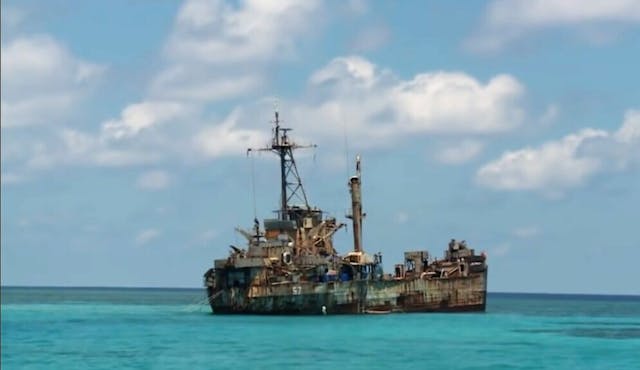
另一方面,中國海警使用高壓水炮阻止菲律賓軍方補給「馬德雷山號」的行動,也是宣示其在爭議領土主權的姿態。
中國外交部表示,一直保持克制,並多次要求菲律賓拖走擱淺軍艦,並指出,海警船針對的是菲律賓向該軍艦運送建築物資的船隻。中方還指菲方曾承諾會拖走擱淺的軍艦,但這一承諾遭到了馬尼拉方面的否認,小馬可斯總統說,如果存在這樣的協議,他會將該協議廢除。
從公開的片段來看,水炮似乎並沒有直接射中菲律賓軍方的補給船。 這看起來不像是一次大事件,但顯示了雙方對爭議地區主權的主張。
據報道,4艘菲律賓船隻涉及「水炮射擊事件」,其中包括兩艘海岸警衛隊船隻和兩艘租賃船隻,同時,還包括6艘中國海警船和兩艘中國漁船。
不過,菲律賓一些政界人士似乎反應激烈。這並不奇怪,因為菲律賓政客往往分為兩派:一派支持發展對華友好外交;另一派則更親美,支持對北京採取強硬的民族主義政策。從菲律賓國家安全委員會助理總幹事馬來亞(Jonathan Malaya)堅稱菲律賓「永遠不會放棄阿永金暗沙」時,就可看出強硬派的言論。
必須指出的是,菲律賓前總統杜特爾特與中國建立了更友好關係,他知道菲律賓夾在中美強權政治和地區競爭之間,有必要成為一個更加中立的角色。
小馬可斯親美 犧牲中菲和諧關係
然而,現任菲律賓總統小馬可斯一直採取比杜特爾特更親美的政策。小馬可斯政府根據2014年的《加強防務合作協議》,允許華盛頓使用另外4個軍事基地,該協議規定了聯合軍事訓練、軍事裝備的使用,以及包括倉儲和跑道在內的軍事設施的建設。美國向菲律賓提供了軍事援助。在小馬可斯政權領導下,美國與菲律賓的關係得到加強,但犧牲了馬尼拉與北京之間更加和諧的關係。
水炮事件促使美國國防部長奧斯汀在與菲律賓國防部長小特奧多羅通話時強調「美菲同盟堅不可摧」。美方批評中方「威脅」地區和平和安全穩定。
中國外交部長王毅隨後批評美方在南海挑起事端,給中菲關係「火上澆油」。他還批評美國「挑動是非,慫恿對抗」,破壞南海的和平安寧。王毅表示,中方希望地區國家警惕「幕後黑手」,把主導權掌握在自己手中。
王毅在訪問新加坡、馬來西亞期間表示,中方多次向菲方提出通過雙邊對話處理分歧的意願。中方願與東盟各國一道,加快推進「南海行為準則」磋商,早日達成符合國際法的地區規則。
另一方面,小馬可斯總統表示,菲中雙方將就爭議地區進行進一步討論。他說:「當然,中國的立場是,他們說:『這是我們的,所以我們正在捍衛它』,而我們則說:『不,那是我們的,因此我們要捍衛它』。 這便成為我們正在討論的灰色地帶。」
如果中菲雙方願意坐下來就南海島礁的領土爭議進行談判,那麼水炮事件有望以冷靜、明智和外交的方式得到解決。
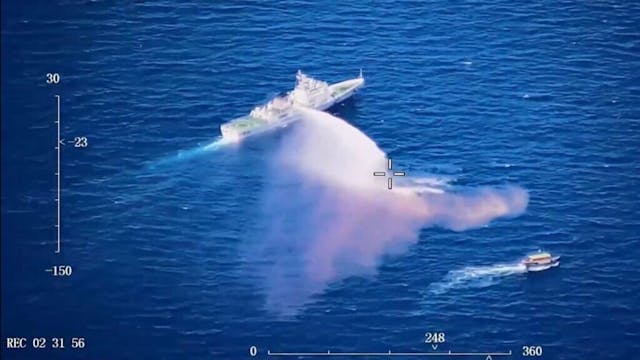
水炮事件或成衝突導火線
整個水炮事件突顯了中國與鄰國在南海島礁的領土爭端上存在潛在爆發點。
首先,美國與菲律賓及其他美國盟友之間的地緣政治同盟,使得中國為維護其對南海島礁主權主張而採取的任何行動都變得極其敏感和政治化。除了美菲防衛同盟外,日本還準備向菲律賓提供軍援,包括海岸防衛隊船隻和軍艦。 正如自民黨副總裁麻生太郎最近訪問台北時所說的那樣,日本表達了對台灣的政治和防禦支持,這也激怒了中國。一方面是中國與美國互不信任,另一方面是日本表示對菲律賓的支持,似乎對亞太地區和平的未來不是好兆頭。
美國的盟友與菲律賓之間的牢固關係,意味着馬尼拉在與北京圍繞南海島礁的爭端中,或許必須更加謹慎、微妙和講究技巧。馬尼拉的任何可能向美國傾斜的不平衡都可能導致與北京的緊張關係──菲律賓前總統杜特爾特避免了這種不平衡。
其次,中國海警行動可能要更加謹慎地使用水炮。儘管中方對爭議領土主張主權是可以理解的,但中國海警船隻的任何溫和行動都可能會被亞洲鄰國誤會和曲解,其中一些國家對中國在南海的軍事擴張和意圖投以懷疑的目光。
第三,如果華盛頓希望與北京恢復更加和諧的關係,對於類似水炮事件的反應也許要更明智,並在評論上更加克制。的確,在國際政治世界中,保持中立是極其困難的,但正如王毅所言,美方的言論似乎是火上澆油,不必要地給事件搧風點火。但從平衡和遏制中國影響力的另一個角度來看,美國迅速批評中國海警在仁愛礁的行動也是可以理解的。
第四,東盟有必要最終敲定、認可和實施「南海行為準則」,以避免該地區發生任何不必要的國際軍事衝突。中國與其亞洲鄰國之間有必要建立信任──大多數亞洲國家不會將中國視為「威脅」,而是希望在和諧共贏的局面中擁抱中國的快速崛起。
綜上所述,水炮事件看來只是小風波,但它可能成為使中國和菲律賓陷入不必要的爭端和衝突的導火線。北京和馬尼拉都不願意看到任何衝突,而事實上兩國都表現了坐到談判桌前就爭議進行溝通的共識。最重要的是,水炮事件表明地緣政治的複雜性,中美競爭使菲律賓和中國之間的關係變得複雜化,中國與美國其他盟友之間的地緣政治競爭,也可以在水炮事件中輕易看出。在這種情況下,馬尼拉可能不得不考慮杜特爾特政府巧妙地平衡美國和中國而不明顯偏向任何一方的優點。另一方面,中國海警也許只能採取極其謹慎、更加克制的態度,來應對菲律賓類似企圖表明馬尼拉對南海爭議海域主權的舉動。無論現在或未來,彼此表現克制可能是避免國際政治誤解的最重要因素。
The Geopolitics of the Water Cannon Incident in South Sea
The dispute between China and the ye over the islands in the South Sea was shown in the action of a Chinese coastguard vessel that used water cannon to prevent a Philippine military supply boat from transporting fuel, food and water to troops stationed on an old warship grounded near the Second Thomas Shoal. The incident led to the immediate diplomatic protests from the Philippines, followed by the support from the US and a rebuttal from the Chinese side. The whole incident illustrates the complex geopolitics in the territorial dispute over the islands in the South Sea.
The Philippines government summoned the envoy of the People’s Republic of China (PRC) in Manila to protest the Chinese coastguard action.
The PRC asserts that it has sovereignty over the submerged reef, namely Ren’ai (or Ayungin in Philippines), and that the Philippines military should remove the grounded warship from the reef region. The Philippines side has been refusing to do so.
Historically, China has claimed its sovereignty over the Second Thomas Shoal in the South Sea. Its sovereignty extends to the “nine-dash line” that covers some of the economic zones of other claimants, including Taiwan, Brunei, Malaysia, Indonesia, Vietnam, and the Philippines. During the naval conflicts between China and Vietnam in 1974, the PRC got back the Paracel Islands. In 1995, the PRC controlled the Mischief Reef, whose sovereignty was claimed by the Philippines. In 2016, an international tribunal in Hague dealt with a lawsuit launched by the Philippines and it decided that China’s “nine-dash line” and historical claims were superseded by the United Nations Convention on the Sea. But China did not recognize the rulingand said that it was a drama staged in the name of the international law with the behind-the-scenes manoeuvre of the US.
The Philippines in 1999 grounded its old warship, namely Sierra Madre, at the Second Thomas Shoal as a show of its assertion of sovereignty over the disputed waters. The Shoal is situated east of the Mischief Reef and is near the Philippine Island of Palawan.
The Philippines action of stationing some troops on Sierra Madre and providing logistical supplies to them regularly was a gesture of asserting its sovereignty.
On the other hand, the Chinese coastguard action of using water cannon to target at the Philippine military supply boat was also a gesture of asserting its sovereignty in the disputed territory.
The Chinese foreign ministry said that it exercised restraint all the time and repeated the demand for the Philippines to tow away the grounded warship, adding that the coastguard vessels targeted at Philippines ships that carried construction materials to the warship. The PRC side also added that the Filipino side had promised to remove the grounded warship. The Chinese claim of this Philippines promise was rejected by Manila, and President Marcos added that if such a promise existed, he would “rescind” it.
From the video shown in public, it seems that the water cannon did not directly hit the Philippines military supply boat. It looks like a minor incident showing both sides’ assertions of theirsovereignty over the disputed area.
It was reported that four Philippines vessels were involved in the water cannon saga, including two coastguard vessels and two chartered vessels. Moreover, there were six Chinese coastguard vessels and two Chinese fishing vessels.
However, some politicians in the Philippines appeared to react strongly. This is not surprising given the fact that the Philippine politicians are often divided into those who are more supportive of a friendly diplomacy toward China and those who are more pro-American and supportive of a hardline and nationalist policy toward Beijing. The remarks of the hardliners can be seen when Jonathan Malaya, a spokesperson of the Philippines national security council, insisted that his country would “never abandon Ayungin Shoal.”
It must be noted that former Philippines President Rodrigo Duterte adopted a more friendly relationship with the PRC, knowing the necessity of making the Philippines a more neutral actor that was sandwiched between the power politics and regional rivalry between the PRC on the one hand and the US on the other.
However, the current Philippines President Ferdinand Marcos Jr has been adopting a more pro-US policy than Duterte. The Marcos government has given Washington access to four additional military bases under the Enhanced Defence Cooperation Agreement in 2014, an agreement that provides for joint military training, the use of military equipment, and the construction of military facilities including storage and runways. The US has provided military aid to the Philippines. Under the Marcos regime, the US relations with the Philippines have been strengthened at the expense of a more harmonious relationship between Manila and Beijing.
The water cannon incident prompted the US defence secretary Lloyd Austin to stress the “ironclad nature of the US-Philippines alliance” during a call with the Philippine defence secretary Gilberto Teodoro Jr. The US side criticized the Chinese side for “threatening” regional peace and stability.
The PRC Foreign Ministry Wang Yi then criticized the US side for stirring up troubles in the South Sea and for “adding the fuel on the fire” on Sino-Philippines relations. He also criticized the US for “instigating confrontations” with China and undermining the peace and calmness in the South Sea. According to Wang, China hopes that countries in the region should be on guard over the “black hand” behind the scenes and that they should grasp the leadership right into their own hands.
During his visit to Singapore and Malaysia, Wang Yi said that China raised to the Philippines many times on its willingness to deal with mutual opinion differences through bilateral dialogue.Moreover, China would like to work with the ASEAN on the regional rules and regulations in accordance with the international law.
On the other hand, President Marcos indicated that both the Philippines and Chinese side would discuss further on the disputed areas. He said: “The position of China, of course, is they say, ‘this is ours, so we are defending it’ and we, for our part, are saying ‘no, we own it, so we are defending it.’ So that becomes a grey area that we are discussing.”
If the Chinese and the Philippines sides are willing to sit down in the negotiating table to talk and discuss about territorial dispute over the islands on South Sea, then the water cannon saga would hopefully be tackled in a calm, wise and diplomatic manner.
The whole water cannon incident illustrates the potential flashpoint between China and its neighbours over territorial disputes in the islands of South Sea.
First, the geopolitical alliance between the US and the Philippines and other American allies has made any action taken by China to assert its sovereignty claims over the islands in South Sea extremely sensitive and politicized. Apart from the US-Philippines defence alliance, Japan has agreed to provide coastguard and military vessels to the Philippines. Japan’s expression of its political and defensive support of Taiwan, as Liberal Democratic Party vice president Taro Aso commented during his recent visit to Taipei, has also angered China. The distrust between China on the one hand and the US, the Philippines and Japan on the other hand does not appear to bode well for the future of peace in the Asia-Pacific region.
The strong relations between the US allies and the Philippines mean that Manila may have to be more careful, delicate, and subtle in Manila’s dispute with Beijing over the islands in South Sea. Any imbalance in Manila’s orientation that may be tilted toward the US side would perhaps bring about tense relations with Beijing – an imbalance that was avoided by President Duterte.
Second, China’s coastguard action may have to be more careful in its usage of water cannons. Although it is understandable that the Chinese side asserted its sovereignty over the disputed territory, any mild action on the part of its coastguard vessels could be misperceived and misinterpreted by Beijing’s Asian neighbours, some of whom cast suspicious eyes on the PRC’s military expansion and intention in South Sea.
Third, if Washington wishes to return to more harmonious relations with Beijing, its responses to a similar water cannon incident will perhaps need to be wise and to exercise more restraint in verbal comments. Indeed, in the world of international politics, neutrality is extremely difficult. But, as Wang Yi mentioned perhaps quite fairly, the remarks from the US side appeared to add fuel to the fire, fanning the flames of an accident unnecessarily. However, from another angle of balancing and containing the PRC influence, it is understandable that the US promptly criticized the Chinese coastguard action atthe Second Thomas Shoal.
Fourth, it is imperative for ASEAN to finalize, endorse and implement the code of conduct for South Sea so that any unnecessary international military conflicts in the region would be avoided. Trust-building will be necessary between China and its Asian neighbours. Instead of seeing China as a “threat,” most Asian states will hopefully embrace its rapid rise in a harmonious and win-win situation.
In conclusion, the water cannon incident appears to be a minor one, but it can be a flashpoint that draws the PRC and the Philippines into an unnecessary dispute and unwanted conflict. Neither Beijing nor Manila would like to witness any conflict, but in fact both countries have exhibited a consensus of sitting down on the negotiating table to communicate further over disputed issues. Most importantly, the water cannon incident demonstrates the complexities of geopolitics under which the US-China rivalry is complicating the relations between the Philippines and the PRC. Geopolitical rivalries between China and other US allies can also be easily seen in the water cannon saga. Under these circumstances, Manila may have to consider the virtue of the Duterte regime in balancing the US and China subtly and skilfully without tilting toward any side prominently. On the other hand, the Chinese coastguard vessels may have to be extremely cautious in exercising even more restraint in dealing with similar Philippines attempts at making gestures to demonstrate Manila’s sovereignty over the disputed waters in South Sea. Mutual restraints are and will perhaps the most important ingredient avoiding misperceptions in international politics.
原刊於澳門新聞通訊社(MNA)網站,本社獲作者授權轉載。原文網址:https://www.macaubusiness.com/opinion-the-geopolitics-of-the-water-cannon-incident-in-south-sea/



